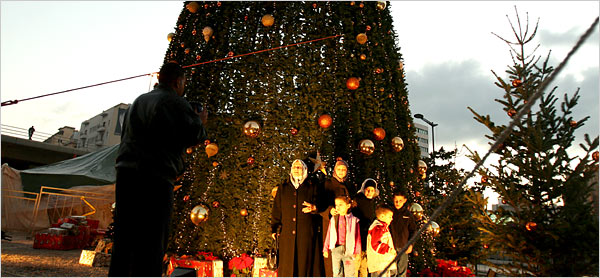 The New York Times, By HASSAN M. FATTAH, BEIRUT, Lebanon, Dec. 28
The New York Times, By HASSAN M. FATTAH, BEIRUT, Lebanon, Dec. 28
In Riyadh al Solh square, where protesters have camped out in a tent city, Hezbollah and its allies are demanding that Mr. Siniora resign and are saying he should be put on trial for treason and corruption. Last week, they ratcheted up their demands, calling for early parliamentary elections. Up above in the Grand Serail, the government headquarters, Mr. Siniora, urged to stand firm by Saudi Arabia and the United States, shows no signs of wavering, insisting that Hezbollah and its allies come off the streets and return to the negotiating table.
“Their sit-in did not produce what they thought it would,” said Marwan Hamadeh, minister of telecommunications, who predicted the crisis could last until Lebanon’s presidential elections next November. “They simply cannot win.”
The rallies have been muted in recent days so families could celebrate Christmas or prepare for Id al-Adha, the Muslim Feast of Sacrifice, at the weekend. But opposition leaders threaten to raise the pitch next week, suggesting that they may block highways and access to Beirut’s airport.
The business of governing Lebanon has come to a virtual halt, with President Émile Lahoud unwilling to consider any legislation offered by the cabinet, the cabinet unwilling to speak to Mr. Lahoud, and the speaker of Parliament, the Shiite Amal leader Nabih Berri, unwilling to convene a session or speak to the president. Opposition members of Parliament walked out in late November and have not returned.
“Each side is supported by people that don’t want them to give up a thing,” said Paul Salem, director of the Carnegie Middle East Center, speaking of both internal and foreign backers. “It’s becoming more likely that a very long, drawn-out stalemate will take hold.”
Gradually, Mr. Salem and others here say, Beirutis are growing used to the demonstrations in the center of town, finding ways around the traffic snarl the protests have caused, and feeling less urgency to resolve the standoff. Some restaurants are asking their patrons — and individual Lebanese are asking their friends — not to discuss politics.
“The easiest thing for people to do now is to postpone, to stall,” Mr. Salem said.
Hezbollah and its allies took to the streets on Dec. 1 after the governing coalition led by Mr. Siniora rejected their demands. They set upon the center of Beirut with a noisy but peaceful protest mirroring the one led by the March 14 movement last year that forced Syria out of Lebanon and swept its leaders into power.
Much like the March 14 movement, the opposition has sought to emphasize its sectarian mix, insisting it represents the true Lebanese.
The protests continue to sap Lebanon’s economy, already damaged by Israel’s bombardment of the country during the summer. Store owners in downtown Beirut briefly opened this week but they saw few customers.
“We will carry on with this campaign until we topple the government,” said Nabil Nicola, a Parliament member with the Free Patriotic Movement of Michel Aoun, a Christian allied with the opposition. “We still have not used all the peaceful weapons available to us, and it’s just the beginning of the road.”
On Saturday, Amr Moussa, the secretary general of the Arab League, said he had been unable to negotiate a solution in two weeks of shuttle diplomacy but promised to resume his efforts after the Muslim holiday. He said the impasse had been made worse by the fact that the sides refused to communicate with each other. Hezbollah accuses him of backing the governing coalition.
“Unfortunately Amr Moussa was taking a side during his last round of negotiations and unfortunately some Arab countries are taking sides too, but there are talks about a new, less biased Arab initiative,” said Nawar Sahili, one of Hezbollah’s members of Parliament. “We are hoping it will solve the crisis.”
Analysts and officials close to the discussion said the most contentious issue remains a bill rushed through to Parliament days after the opposition walked out. The ruling coalition has a majority in Parliament but Mr. Berri has refused to hold a meeting of Parliament. The bill calls for formation of an international tribunal with sweeping powers to prosecute suspects implicated in the February 2005 assassination of the former prime minister, Rafiq Hariri, and other assassinations.
Mr. Moussa, speaking to reporters in Beirut on Saturday, said he had managed to coax both sides to agree to the outlines of a national unity cabinet in which major decisions would be made by consensus.
But in Riyadh al Solh square, many said they were ready for a long fight. “When Omar Karami was prime minister, one person said a word and he resigned,” Ali al-Faqih, a protester, said of the interim prime minister forced to resign during the anti-Syrian protests. “Now, one million people have come and said ‘Leave,’ but this guy is still clinging on. He’s no gentleman.”



